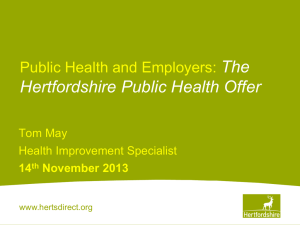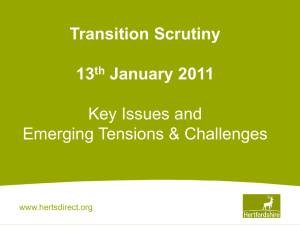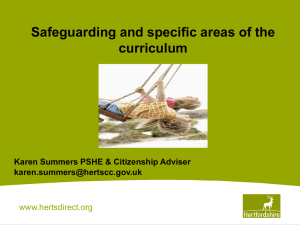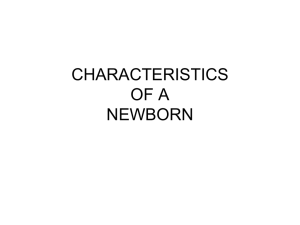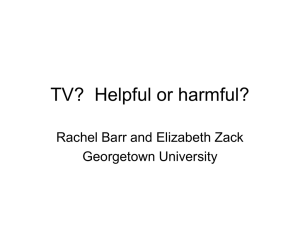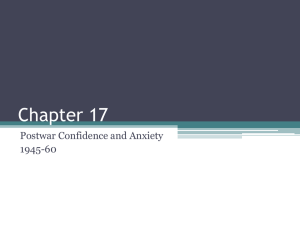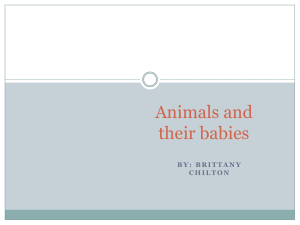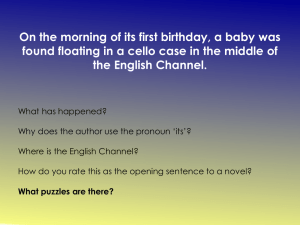My Baby`s Brain
advertisement
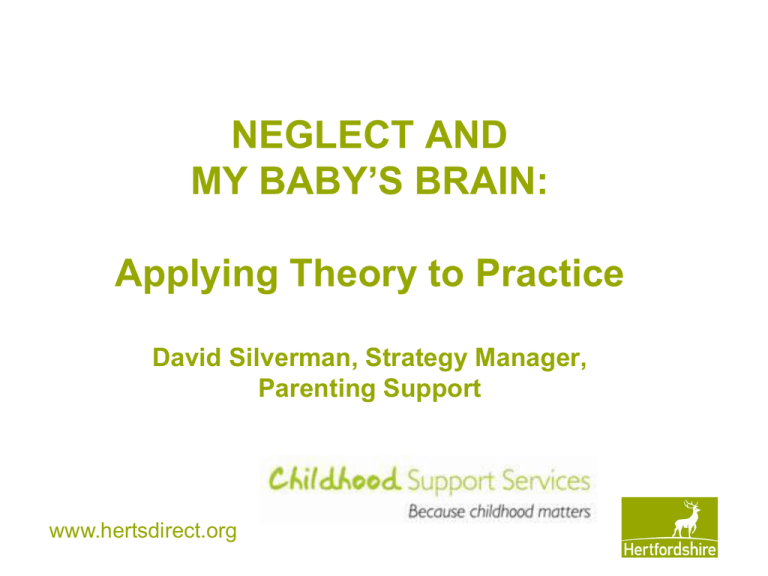
NEGLECT AND MY BABY’S BRAIN: Applying Theory to Practice David Silverman, Strategy Manager, Parenting Support www.hertsdirect.org My Baby’s Brain Applying policy to practice www.hertsdirect.org My Baby’s Brain • The Rationale • The Implementation • Theory into Practice www.hertsdirect.org My Baby’s Brain: Applying Theory to Practice in Hertfordshire My Baby’s Brain is an early intervention programme promoting secure attachment in families with babies and young children 0-3, in the everyday home environment www.hertsdirect.org My Baby’s Brain The Rationale Parenting in the early years is one of the most significant influences on a child’s wellbeing, resilience and life chances www.hertsdirect.org My Baby’s Brain The Rationale • The volume of the human brain increases more during the first year of life than at any time (from 400gm to 1000gm) • This growth spurt continues into the 2nd year, with substantial production of nerve cells and synapse connections or pathways. www.hertsdirect.org My Baby’s Brain: Density of neural connections at 2 months www.hertsdirect.org My Baby’s Brain: Density of neural connections at 3 months www.hertsdirect.org My Baby’s Brain: Density of neural connections at 6 months www.hertsdirect.org My Baby’s Brain: Density of neural connections at 12 months www.hertsdirect.org My Baby’s Brain www.hertsdirect.org My Baby’s Brain • Brain development depends on predictable, nurturing, repetitive and responsive parental behaviour, “attuned” to the child’s stage of development • This includes specific experiences, including responsive gaze, handling, and talking to the baby Child Abuse and Neglect and the Brain – A Review (Danya Glaser, Journal 0f Child Psychology and Psychiatry, 2000) www.hertsdirect.org My Baby’s Brain The Rationale “Decades of research tell us that mutually rewarding interactions are essential prerequisites for the development of healthy brain circuits” ‘The science of early childhood development’ Centre on the Developing Child Harvard University 2007 www.hertsdirect.org My Baby’s Brain www.hertsdirect.org My Baby’s Brain The Rationale • Secure attachments in the first 2 years lay the foundations for resilience, positive mental health and wellbeing, and the ability to create healthy relationships in adolescence and adulthood • Secure attachments in the first 2 years lay the foundations for secure attachments into adulthood www.hertsdirect.org My Baby’s Brain • Attachment has effects across the life-course www.hertsdirect.org My Baby’s Brain The Rationale Neglect and insecure attachments can lead to: • • • • • • Difficulties in forming attachments and relationships Increased risk of physical and mental ill-health Increased risk of substance misuse Lower educational achievements Difficulties in assuming parenting responsibilities Difficulties in nurturing attachment www.hertsdirect.org My Baby’s Brain Implementation • A multi-agency project conveying to parents of babies (aged 0-3), in a simple, accessible way, the principles of attachment and early brain development. • Printed and on-line resources • “Five to Thrive” – a simple “5-a-day” message • Training for Children’s centre workers, health visitors, social workers etc. who incorporate “Five to Thrive” into their everyday work with parents www.hertsdirect.org My Baby’s Brain www.hertsdirect.org My Baby’s Brain The Implementation • Weaving “Five to Thrive” into the everyday work of health visitors, children's centre workers, social workers etc. • A common message across agencies • Conveying to parents of young children (0-3) the principles of attachment and impact of attachment behaviours on baby brain development, in simple accessible language www.hertsdirect.org My Baby’s Brain: 600+ staff trained Children’s Centre staff GPs Educational Psychologists Intensive Family Support workers School workers Social Workers Health Visitors Student Health Visitors Library workers www.hertsdirect.org Nursery nurses and childcare workers www.hertsdirect.org/mybabysbrain www.hertsdirect.org My Baby’s Brain: Implementation • • • • • The ‘Red Book’ Child Health Record NCT and antenatal sessions 150+ early years childcare settings trained 140 childminders trained Link between My Baby’s Brain and parenting assessments (Graded Care Profile) • “Recovery” Project to address insecure attachment (It’s not too late!) www.hertsdirect.org Application of My Baby’s Brain: 1 • Child on Supervision Order • CIN Plan • Team Around the Family: Social worker, health visitor, children’s centre – a consistent message • Parent with learning disability and mental health problems • Two children looked after • Practical application of “Five to Thrive” in CIN visits www.hertsdirect.org Application of My Baby’s Brain: 2 • • • • • • • • • • Teenage Parent Her own mother requested support for her at the age of 3 Anger issues Under-achieving at school Addiction Trouble with the police Domestic violence Difficult relationships Possible postnatal depression Relationships – Own family – Children – Partner www.hertsdirect.org Impact of My Baby’s Brain “I don’t want what happened to me to happen to my children. I love my children and I want to be a good mum. I have recognised and am working on my own anger issues and I have to do this to help my children.” “I am a good parent. I can listen to other people now, I might not agree or like what they say! I can ask for help and accept help now. I know that I need help in my relationship with my partner if we are going to stay together but my children are more important.” “Being with my children is all that matters and I want the best for them.” www.hertsdirect.org My Baby’s Brain References Early Intervention: Next Steps (Allen Report) Parenting Matters, Chris Paterson. Centre Forum The Science of Parenting. Margot Sunderland Why Love Matters. Sue Gerhardt Attachment Across the Lifecourse. David Howe Attachment in Common Sense and Doodles. Miriam Silver www.hertsdirect.org/mybabysbrain www.hertsdirect.org My Baby’s Brain Thank you www.hertsdirect.org
